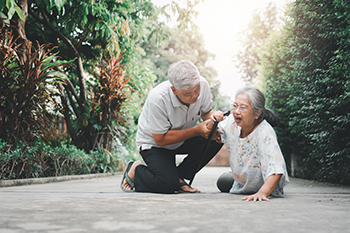
As people age, even a minor fall can lead to serious consequences, including injury, disability, or worse. Annually, an alarming 36 million falls occur in adults over 65, making fall prevention essential. Unfortunately, the leading risk factor for falls in older adults is a history of prior falls. Muscle weakness and gait abnormalities are risk factors for falls. In addition, foot, knee, or back pain, weight changes, and lack of sleep can increase the risk. Prior injuries also increase the risk. Many health conditions amplify the risk of falling, especially in older adults. Among them are inner ear problems, poor vision, and dementia. Further, a vitamin D deficiency, arthritis, osteoporosis, and neurological diseases can pose problems that make falling more likely. Medications can also play a role. Blood pressure meds may cause postural hypotension, and certain sleep products are linked to memory problems and higher fall risk. Prevention of falls involves home modifications, regular exercise, and medical checkups. For additional guidance on how to keep from falling, it is suggested that you schedule an appointment with a podiatrist.
Preventing falls among the elderly is very important. If you are older and have fallen or fear that you are prone to falling, consult with Zina Cappiello, DPM from Dr. Zina B. Cappiello DPM, LLC. Our podiatrist will assess your condition and provide you with quality advice and care.
Every 11 seconds, an elderly American is being treated in an emergency room for a fall related injury. Falls are the leading cause of head and hip injuries for those 65 and older. Due to decreases in strength, balance, senses, and lack of awareness, elderly persons are very susceptible to falling. Thankfully, there are a number of things older persons can do to prevent falls.
How to Prevent Falls
Some effective methods that older persons can do to prevent falls include:
- Enrolling in strength and balance exercise program to increase balance and strength
- Periodically having your sight and hearing checked
- Discuss any medications you have with a doctor to see if it increases the risk of falling
- Clearing the house of falling hazards and installing devices like grab bars and railings
- Utilizing a walker or cane
- Wearing shoes that provide good support and cushioning
- Talking to family members about falling and increasing awareness
Falling can be a traumatic and embarrassing experience for elderly persons; this can make them less willing to leave the house, and less willing to talk to someone about their fears of falling. Doing such things, however, will increase the likelihood of tripping or losing one’s balance. Knowing the causes of falling and how to prevent them is the best way to mitigate the risk of serious injury.
If you have any questions, please feel free to contact our office located in Clifton, NJ . We offer the newest diagnostic and treatment technologies for all your foot care needs.
